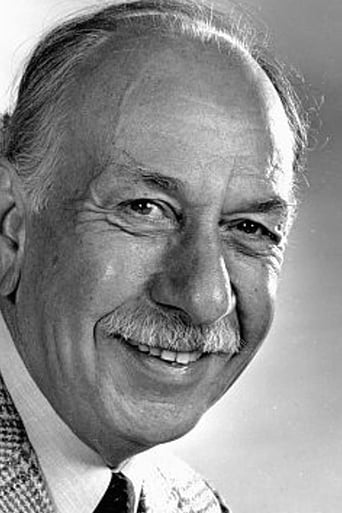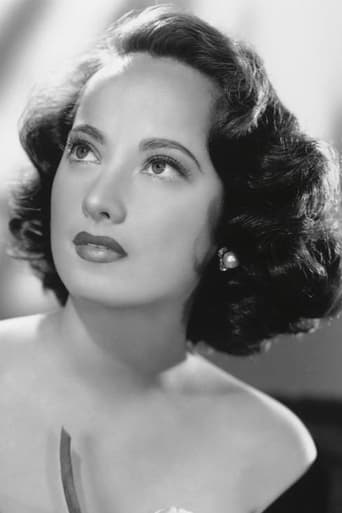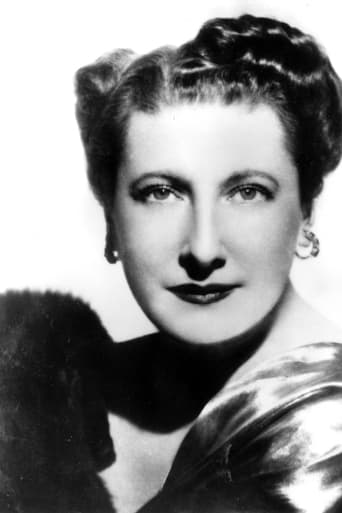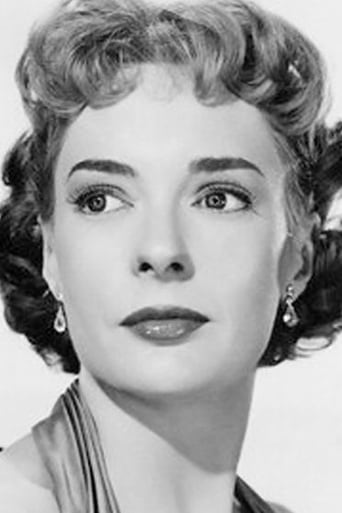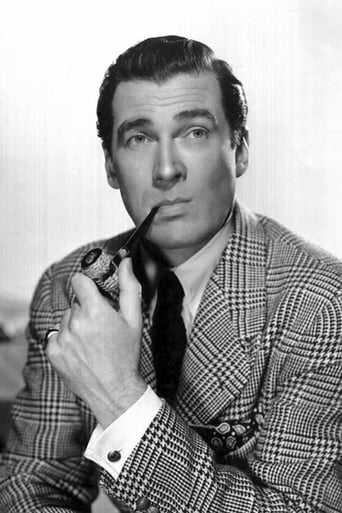Kattiera Nana
I think this is a new genre that they're all sort of working their way through it and haven't got all the kinks worked out yet but it's a genre that works for me.
Freaktana
A Major Disappointment
PiraBit
if their story seems completely bonkers, almost like a feverish work of fiction, you ain't heard nothing yet.
Caryl
It is a whirlwind of delight --- attractive actors, stunning couture, spectacular sets and outrageous parties. It's a feast for the eyes. But what really makes this dramedy work is the acting.
weezeralfalfa
My title comes from Ferrer's twice burlesquing of the title of one of Sigmund Romberg's most popular musical plays "The Student Prince", the lyrics of which were done by his Irish- American friend Dorothy Donnelly, here played by Merle Oberon, who serves as his quasi-girlfriend in the film, until he meets the woman who will become his second wife: a rather faceless Lillian Harris, played by Doe Avedon. Unlike Dorothy, who was Romberg's contemporary in age,Lillian was 18 years younger than her aging fiancé. Dorothy never married and, as indicated in the film, died unexpectedly at the height of Romberg's career. Although not hinted in the film, like so many of America's famous theater people of the early 20th century, Romberg was a Jew, who fled the pre-Hitler anti-Semitism of eastern Europe, Germany, and Russia. Thus, he had to learn a new language and musical culture before embarking on a new musical career. As shown in the film,he did begin by playing the piano and occasionally composing songs in various NYC restaurants, later to be hired as a composer for shows, before becoming an independent composer. Most of the plentiful melodrama relates to disputes with show producers over his compositions, or problems with his future wife's domineering mother, who initially was not impressed with his style of popular compositions. I was initially attracted to purchase a DVD of this film because it mentioned that Romberg was the composer of "Desert Song". I have treasured my very hard to find DVD of the 1953 film adaptation, starring Gordon MacRae and Kathryn Grayson.I see that, very recently, the 1955 TV version, starring Nelson Eddy, was released on DVD. Incidentally, both this site and the Wikipedia article on the present film got the source for Anne Miller's "It" performance wrong. Obviously, it's not from "Desert Song", as indicated, but rather from "Artists and Models": a burlesquing of the roaring '20s... Other film adaptations of Romberg's works include the 1954 "Student Prince", featuring Mario Lanza'a voice, if not troublesome body, and "Maytime", as well as "New Moon", both starring Jeanette MacDonald and Nelson Eddy, back 15-20 years before. Thus, there was a rash of Romberg revivals on film or TV within a few years after his death in '51.Getting back to this film, I was disappointed that not more songs from "Desert Song" were included. Also, Oscar Hammerstein II, who wrote or co-wrote the lyrics for several of Romberg's best known works(including "Desert Song"), wasn't mentioned until nearly Dorothy's death, and was barely included at all in the film. I didn't find Helen Traubel's singing voice very engaging, which is unfortunate, since she got 5 numbers to sing, whereas everyone else got only one. Jeanette MacDonald was the original choice to play her character, and I'm sorry this didn't work out. While her "Stout-Hearted Men" was OK, this was obviously meant for a man to sing, thus I will continue to prefer Nelson Eddy's rendition, for example. Actually, I see no necessity for Helen's purely fictional character, other than perhaps to provide some additional continuity to the story, besides Ferrer and Oberson, as Dorothy. Also Ferrer's singing voice is quite mediocre, as displayed in the finale "When I Grow Too Old to Dream". Thankfully, a chorus finished up this song. On the other hand, I found him quite engaging as Romberg. You may or may not find amusing his impromptu impersonation of the various characters in his then current project., about midway in the film. Clearly, his future mother-in-law wasn't impressed. I did find it rather good, including the derisive song "Fat, Fat, Fatima", lyrics by Ballard McDonald.Turning to the various 'guest' performers: noted ballerina/dancer Tamara Toumanova, as Gabe, sings(dubbed) and dances a bit to "Softly, as in a Morning Sunrise", in a very gaudy outfit and set, which Romberg clearly doesn't like. It was fun seeing the two Kelly brothers sing and dance a bit. They did look amazingly alike, thus it wasn't necessary to resort to trick photography, (as in "Cover Girl"),to see Gene dancing with a double of himself. Jane Powell and Vic Damone did a good job in a romantic outdoor scene with "Road to Paradise" and the classic "Sweetheart", from "Maytime". Anne Miller does a great job with a charleston-tap dance hybrid, to "It", with various outrageously- dressed or costumed roaring '20s characters as a preliminary and backdrop. This production was certainly the highlight of the film for me. William Olvis does an excellent job with the classic "Serenade", from "The Student Prince". Cyd Charisse, in a strange opulent set, sings(dubbed) "One Alone" from "Desert Song", followed by a very entwining ballet with wooden-faced James Mitchell. Howard Keel then belts out the patriotic "Your Land and My Land", from the Civil War-oriented "My Maryland". A bit later, Tony Martin warbles the romantic "Lover, Come Back to Me", from "The New Moon". My DVD has an outtake of George Murphy singing "Girlies of the Cabaret", featuring a parade of outrageously costumed 'girlies', representing various countries, with Esther Williams representing 'Miss USA'. This should not have been deleted! The opening symphonic medley was also very good.
blanche-2
"Deep in My Heart" is a 1954 MGM musical starring Jose Ferrer. It purports to tell the story of Sigmund Romberg, and while much I'm sure is left out, the film is filled with not only great music, but great singing.Well directed by Stanley Donen, the movie shows us Romberg trying to fit in with the musical comedy style, but really having a talent with a more classical, operetta-like bend.Not only is the music beautiful, but it is exquisitely sung by some of the best singers of that era. My favorite song, "Softly, as in a Morning Sunrise" from "New Moon" is initially sung by the great Wagnerian opera star, Helen Traubel. And be still my heart, my second favorite song, "Lover Come Back to Me" is sung by Tony Martin and Joan Weldon. Martin was for me the best tenor of that time, better than Allan Jones, James Melton - absolutely phenomenal. MGM pulled out all the stops, with Cyd Charisse and Ann Miller taking part in "One Alone" and "It" respectively; Vic Damone is on hand for a well-sung "The Road to Paradise," and he's joined by Jane Powell for "Will You Remember" from "Maytime," which in the beginning of the film is the operetta Romberg keeps insisting he wants to do.Gene Kelly and his brother Fred Kelly sing and dance to "I Love to Go Swimmin' with Wimmin" - you an see from the titles that Romberg had a versatility. Howard Keel a strong "Your Land and My Land." The song "Mr. and Mrs." is performed by real-life Mr. and Mrs. Jose Ferrer and Rosemary Clooney. One number after another, a fine film for a music lover.The cast is interesting - Merle Oberon as Romberg's writing partner Dorothy Donnelly, Walter Pidgeon is Shubert, Paul Henried is Flo Ziegfeld, and Dorothy Avedon, who died some months ago, is Romberg's beloved wife Lillian.All in all, a feast for the ears and eyes, with Ferrer doing a beautiful, energetic job as Romberg, even at one point performing an entire musical at full speed by himself. Very impressive.A gem from MGM.
marcslope
The light touch and sense of fun evident in so much of Stanley Donen's musical work is almost entirely missing from this ten-ton biopic of Sigmund Romberg, played diligently but without charm by Jose Ferrer. Apparently it just wasn't a very interesting life, so MGM masked a near-total absence of drama with a bevy of guest appearances. Some work out beautifully, though most of these have more to do with dance than Romberg's melodies: a nifty tap production number with Ann Miller, an extremely hot "Desert Song" pas de deux by Cyd Charisse and James Mitchell, a lively comedy routine with Gene Kelly and his brother Fred. But the best of Romberg is stiffly staged in vignettes featuring a bored-looking Jane Powell and Vic Damone ("Maytime"), William Olvis ("The Student Prince"), and Howard Keel (a very uneasy "My Maryland"). Worse, none of the people surrounding Ferrer seem right: Merle Oberon was nothing like Dorothy Donnelly, and the screenwriters' attempt to create some drama by suggesting she was vainly in love with Siggy falls flat. The love of his life, Mrs. Romberg, is given to a pallid Grace Kelly wannabe, Doe Avedon. Helen Traubel, as his best pal, sings well but is also given too much shtick. Arthur Freed might have invested more vitality than Roger Edens, but it's an unexciting and overlong entertainment, worth sitting through once for the better musical numbers.
mark.waltz
By 1954, a biography of operetta composer Sigmund Romberg seems a bit out of place just two years before Elvis Presley took the recording industry by storm. But Hollywood wasn't giving up on operettas, at least not yet, having just filmed Romberg's "The Desert Song" (for the 4th time, if you include "The Red Shadow, a 1934 short) and "The Student Prince", as well as Rudolph Friml's "Rose Marie". As a movie biography, "Deep in My Heart" is a lot of "and then I did", but it is completely charming. A glorious opening has the MGM chorus singing the title song after a brief orchestral medley of his songs, and don't be surprised if your spine doesn't tingle a bit when the first close-up on Jose Ferrer comes up.As other musical biographies always start, Sigmund Romberg is a hopeful composer who reluctantly writes jazzy tunes (the delightful "Leg of Mutton") to get his name bandied about by Broadway producers. They take his beautiful medley, "Softly as a Morning Sunrise", and turn it into a Folies Bergere type number for his first show, but Romberg insists that he won't be satisfied until he can have his operetta, "Maytime", produced. In the meantime, he writes for a few more reviews, but when "Maytime" is produced, he has an artistic and financial smash on his hands. The pairing of Jane Powell and Vic Damone singing "Will You Remember?" is glorious, which sets the tone for the on-stage numbers. It's ironic here that the best numbers are the ones for his operettas, "The Student Prince", "The Desert Song", and "New Moon". Jazzy numbers like "It", "I Love to Go Swimmin' With Women" are slightly disappointing, as if stating these types of songs didn't have his heart in them. In fact, "It", lively sung and danced by Ann Miller is a little offensive.As far as the storyline goes, the music drops out completely in the middle of the film as Romberg's romance with his future wife Lillian (Doe Averdon) erupts, but fortunately, it's not gone for long. Ferrer gives a hysterical performance while describing the plot and music of his newest show "Jazz-a-Doo" to Averdon and her uppity mother (Isobel Elsom) that is reminiscent of Danny Kaye's early work. Supporting Ferrer, along with his wife, are the lovely Merle Oberon as Romberg's lyricist and book writer Dorothy Donnelly and the amazing Helen Traubel as Anna Mueller, his life-long friend who has the voice of an angel, not to mention the heart of gold to go along with it. Traubel, who made few films, is a gifted comic and steals every scene she is in.For fans of "Funny Girl", there is a nice ironic scene of Walter Pidgeon playing J.J. Shubert in a scene with Paul Henreid as Florenz Ziegfeld. (It's too bad they couldn't get William Powell to play David Belasco or some other Broadway producer of that era.) "Mr. Magoo" and "Thurston Howell III" fans will instantly recognize Jim Backus in the role of one of Romberg's writing partners. Overall, "Deep in My Heart" is typical MGM gloss with only the outline of a story, but works tremendously because of the entertainment quotient it brings. It ranks up there with "Till the Clouds Roll By" and "Three Little Words", and outshines the fictitious Cole Porter story ("Night and Day") and the sanitized "Words and Music" (the Rodgers and Hart story).


